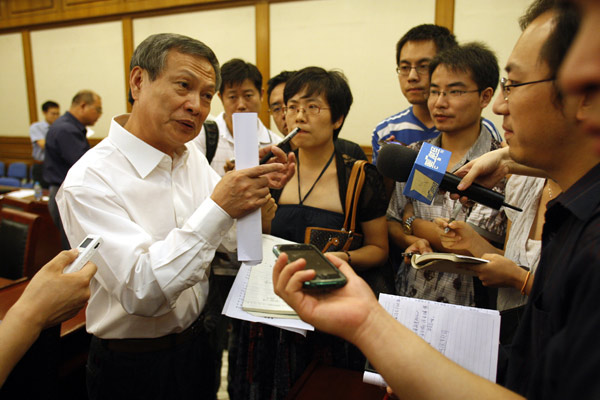Society
Oil leak to have 'long-term impact'
By Wang Qian (China Daily)
Updated: 2011-07-06 06:55
 |
Large Medium Small |
BEIJING - A leak from the Penglai 19-3 oilfield in Bohai Bay, operated by ConocoPhillips China (COPC), will have a "long-term impact" on the marine environment, China's top ocean watchdog warned on Tuesday.
|
 Li Xiaoming, head of the department of marine environment protection under the State Oceanic Administration, speaks to reporters after a news conference in Beijing on Tuesday. [Zhang Wei / China Daily] |
The oil spill polluted an area of more than 840 square kilometers in Bohai Bay, Li Xiaoming, director of the department of marine environment protection at the State Oceanic Administration (SOA), said at a news conference.
"There is still a small leak, but the spill is under control and the cleanup work is almost finished," Li said, adding that the area near the oilfield is the worst affected.
After an investigation that lasted just short of a month, the SOA has finished a preliminary assessment of the environmental impact.

"But as the impact is long-term and complicated, further investigation and assessment are still ongoing," Wang Bin, deputy director of the SOA's marine environment protection department, said.
Penglai 19-3 is China's largest offshore oilfield, with daily production of 160,000 barrels.
It is operated by COPC under a joint development agreement with the State-owned China National Offshore Oil Corporation (CNOOC), the country's largest offshore oil producer.
COPC holds a stake of 49 percent in the project while CNOOC has 51 percent.
On June 4, COPC reported to a branch of the SOA that an oil spill, from an unidentified source, had been detected. The source was confirmed as Platform B at Penglai 19-3 oilfield on June 12. On June 17, COPC reported another oil spill at Platform C to the SOA.
The leaks were brought under control by June 21 and the limited amount of oil on the sea surface, as of Monday, suggested no remaining significant leaks, Li said.
The leaks formed a slick 13 kilometers long and 100-500 meters wide, on June 17, according to Li.
The SOA said 3,000 meters of sea booms were deployed to help contain the spill.
Wang said that COPC faces a fine of 200,000 yuan ($29,850).
The first leak from Platform B occurred on the seabed and resulted from increased pressure when water was injected into the well. This is a common procedure to increase pressure on the oil. The later incident, at Platform C, was due to a surge in the well, the SOA said, without giving details.
The two companies remained silent about the oil leak until Southern Weekend reported the spills on June 30.
The news conference was the first formal one held after the oil leak on June 4, which was first made public on Sina Weibo, a popular micro blog site, on June 21.
Nearly 100 journalists attended the news conference.
The two companies will hold a joint news conference on Wednesday in Beijing to further brief the media about the incident, sources with COPC said.
Experts criticized the two companies for withholding the information from the public and called for stricter law enforcement on environmental protection.
Ma Jun, director of the Institute of Public and Environmental Affairs, told China Daily that he was "surprised" that the oil leak and its "serious" impact could be hidden from the public for such a long time.
Zhong Yu, senior action coordinator at Greenpeace, told China Daily that the environment will take years to recover from the oil spill, no matter how small it was.
China's worst reported oil spill occurred nearly a year ago when a pipeline at Dalian, a busy northeastern port, exploded and oil poured into the sea, covering an area of more than 430 sq km.
Zhong, who joined the cleanup work after the Dalian spill, said she was disappointed because "all the proposals, such as improving regulations and emergency responses, were not taken up".
"Our law on marine environmental protection is outdated and an improvement is urgently needed," she said, adding that the 200,000-yuan fine is "ridiculously" small in terms of the damage caused.
The spill has raised concerns over the potential long-term impact to the area's active fishing industry.
"There are many pollutants in oil, some decompose easily while others do not. If the content is high enough, it can affect people through the food chain," said Zheng Li, an expert at the SOA's First Institute of Oceanography, based in Qingdao, Shandong province.
Zhou Yan, Zheng Jinran and AP contributed to this story.
| 分享按鈕 |